Gaza, genocide, Human Rights, Targeting Muslims, U.S. Militarism, Violations of U.S. and International Law, War Resister
Podcast: Play in new window | Download
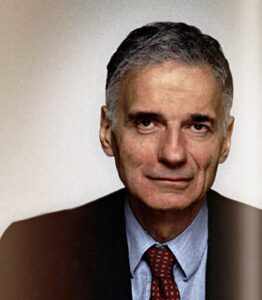

Ralph Nader On Continuing War In Gaza
The American supported Israeli war against the 2.3 million Palestinians living in Gaza continues on since last October. The area, the size of Philadelphia, has been partially obliterated by American fighter planes, bombs, tanks, artillery shells, and bullets.
The number of dead Palestinians is at least 186,000 according to a recent article in the prestigious British medical journal The Lancet.
Israeli Prime Minister Benjamin Netanyahu recently left Washington DC where he came to solidify support in our Congress. It was his fourth visit. Biden’s support for the genocide has been vigorously challenged by Kamala Harris, his choice to replace him. Her election is doubtful. Donald Trump has vowed to “finish the job.”
Guest – Ralph Nader, in a recent article wrote that the number the number of dead is higher than the 39 thousand figure set by Israel, America, and Hamas. Ralph Nader is an attorney, a significant figure in American politics, and a four-time presidential candidate in parties independent to the Republicans and Democrats. Ralph Nader one of the nation’s most effective and well-known social critics. He has raised public awareness and increased government and corporate accountability. As a young lawyer in 1965 he made headlines with his book Unsafe at Any Speed, leading to congressional hearings and passage of a series of life-saving auto safety laws in 1966. His example has inspired a generation of consumer advocates, citizen activists and public interest attorneys. Full biography.
—-
![]()

![]()

Humanitarian Emergency In Gaza
As of June 19, 2024, 37,396 people had been killed in Gaza according to the Gaza Health Ministry, as reported by the UN Office for the Coordination of Humanitarian Affairs. According to a report in Lancet, that number is likely an underestimate. Furthermore, the UN estimates that, by Feb 29, 2024, 35% of buildings in Gaza had been destroyed, so the number of bodies still buried in the rubble is likely substantial, with estimates of more than 10,000.
Even if the conflict ends immediately, there will continue to be many indirect deaths in the coming months and years from causes such as reproductive, communicable, and non-communicable diseases. The total death toll is expected to be large given the intensity of this conflict; destroyed health-care infrastructure; severe shortages of food, water, and shelter; the population’s inability to flee to safe places; and the loss of funding to UNRWA, one of the very few humanitarian organizations still active in Gaza. Experts believe it is not implausible to estimate that up to 186,000 or even more deaths could be attributable to the current conflict in Gaza.
Human rights groups believe an immediate and urgent ceasefire in Gaza is essential, accompanied by measures to enable the distribution of medical supplies, food, clean water, and other resources for basic human needs.
Guest – Professor David Myers is Distinguished Professor of History at UCLA and holds the Sady and Ludwig Kahn Chair in Jewish History. He serves as the director of the UCLA Luskin Center for History and Policy and he also directs the UCLA Initiative to Study Hate. He is the author or editor of many books in the field of Jewish history, including, with Nomi Stolzenberg, American Shtetl: The Making of Kiryas Joel, a Hasidic Village in Upstate New York published by Princeton University Press in 2022. It was awarded the 2022 National Jewish Book Award in American Jewish studies. From 2018-2023, he served as president of the New Israel Fund.

————————
Civil Liberties, Gaza, genocide, Human Rights, Supreme Court, Targeting Muslims, U.S. Militarism, Violations of U.S. and International Law, War Resister
Podcast: Play in new window | Download
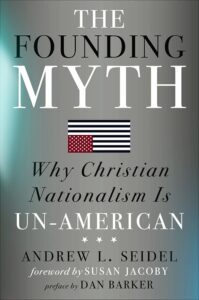
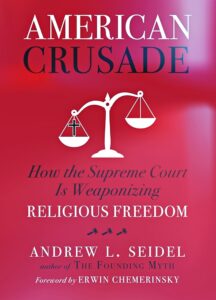
Religious Nationalism and Separation of Church and State
The separation between church and state is a key component of our democracy, ensuring that freedom of belief is a right for all, not a privilege for some. The First Amendment’s establishment clause, “Congress shall make no law respecting an establishment of religion,” has been understood to prohibit the government from establishing an official religion or favoring one religion over others. This interpretation aims to ensure that the government remains neutral in religious matters and does not interfere with or support religious activities, thus maintaining a clear separation between religious institutions and government functions. Despite this, recent rulings by the right-leaning Supreme Court blur the lines between church and state and threaten to undermine this doctrine.
The rise of white Christian nationalism contributes to the degradation of the principle of separation of church and state. This movement reflects broader cultural and demographic trends and exerts significant influence on policy, public discourse, and grassroots movements. Addressing this issue involves understanding the underlying causes and promoting policies that uphold the constitutional commitment to religious neutrality and freedom.
Guest – Attorney Andrew Seidel, is the Vice President for Communications at Americans United for Separation of Church and State, an organization that challenges threats to the First Amendment. He is also the author of two acclaimed books: The Founding Myth: Why Christian Nationalism Is Un-American and American Crusade: How the Supreme Court is weaponizing Religious Freedom.
—-

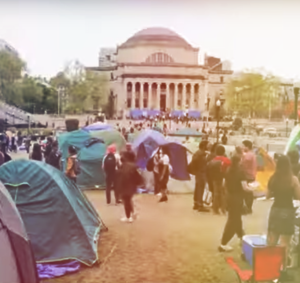
Bend The Arc: Jewish Action
Hamas’ brutal attack on Israel on October 7 and Israel’s deadly and sustained military assault on Gaza have had significant consequences in the United States affecting the presidential election and triggering protests and counter-protests at hundreds of college campuses across the country.
It has also presented a serious test for progressive Jews and progressive Jewish organizations in the United States. One of those organizations is Bend the Arc which describes itself as “building a multiracial, multi-ethnic, inter-generational movement of Jews and allies all across the country who are rising up to build an American future free from white supremacy, antisemitism, and racism.” The Bend the Arc family of organizations includes a C3, C4 and a PAC, and in the past, I served as national chair of Bend the Arc’s C3 board and am currently active in its work in the California Chapter.
Until now, Bend the Arc had a strong boundary around working only on domestic economic and racial justice issues. But that all changed on June 4. On that day, Jamie Beran, CEO of Bend the Arc , sent a letter to President Biden. The letter welcomed Biden’s support for a permanent ceasefire plan in Gaza, but quickly added that, “Time and time again, despite your calls to end this violence, you have not followed through with material action. With over one million Palestinian refugees now being forced to flee Rafah, their last guaranteed refuge, thousands of lives lost, and families of captives being fined in Israel for demanding a ceasefire, it is long past time to end U.S. support for these attacks. Now is the moment to make good on your promise to stop providing offensive weapons to the Israeli military.”
Guest – Jamie Beran, is a leader in the Jewish social justice space. Jamie has built justice organizations that embody their values inside and out. She has held many roles at Bend the Arc in her 15-year tenure, including 9 years of executive leadership, most recently as Chief Operating Officer prior to becoming CEO. Prior to joining Bend the Arc, Jamie was the Leadership Development Director for Habonim Dror North America. Jamie holds a BA from Goucher College and is an alumna of UJA Federation’s and Columbia Business School’s Institute for Jewish Executive Leadership. Jamie lives in Central New Jersey with her husband and two children.

—————————————
Civil Liberties, Civil Rights, genocide, Human Rights, Targeting Muslims, Violations of U.S. and International Law
Podcast: Play in new window | Download


Trump v United States
On July 1, the United States Supreme Court handed down one of the most important decisions in the history of our democracy. In the aptly named case of Trump verses United States, the six arch conservative justices awarded the ex-president – who appointed three of them – a vast and complex criminal immunity scheme.
In three ways the majority delivered Trump a tailor made “Stay-Out-of-Jail” trifecta of expanded constitutional protections for Presidents: First, absolute immunity for crimes committed when a President engages in “core” official acts and a near-conclusive presumption of immunity for other official acts; Second, a brand new rule of criminal procedure making a President’s motives irrelevant; and Third, another new rule excluding evidence of a President’s official acts from a criminal trial for his unofficial acts, which prosecutors offer to prove the ex-president’s prior knowledge and intent.
To help us understand exactly what the Court did and its impact not only on the 91 felony charges currently pending against Trump, but the future of the American presidency and our very democracy, we’ve ask one of our very own co-hosts.
Guest – Stephen Rohde practiced constitutional law for almost 50 years. He’s the author of American Words of Freedom, which examines the Declaration of Independence, the Constitution, and the Bill of Rights. On issues of civil rights, civil liberties and the Americal political system, he is a regular contributor to Truthdig, LA Progressive, Los Angeles Review of Books, and LA Lawyer magazine. This Fall on Ms. Media, he is launching Speaking Freely: A First Amendment Podcast with Stephen Rohde.
—-
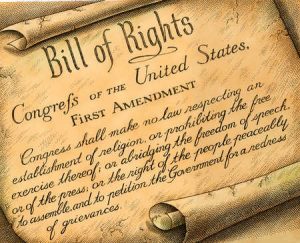

The Palestinian Exception To The First Amendment
The resistance organization Palestine Legal, headquartered in Chicago, was created by our own Michael Ratner and others to resist our governments’ practice of what Michael called “the Palestinian exception to the first amendment.“
This exception to the supposedly protected First Amendment activity of speaking out and organizing by Palestinian solidarity activists is carried out by the repression of the US government nationally and locally. It has never been more ferocious than it is now.
However, the mobilization against the Israeli genocide – carried out with total US support – has not been undeterred by peak anti-Palestinian repression. Palestine Legal has been in the vanguard in defending and promoting the rights of people expressing solidarity with the Palestinians in Gaza.
Guest – Dima Khalidi, founder and Director of Palestine Legal. Her work includes providing legal advice to activists, engaging in advocacy to protect their rights to speak out for Palestinian rights, and educating activists and the public about the repression of Palestine advocates. Prior to founding Palestine Legal in 2012, Dima worked with the Center for Constitutional Rights as a cooperating attorney on the Mamilla Cemetery Campaign, submitting a Petition to United Nations officials to stop the desecration of an ancient Muslim cemetery in Jerusalem, and advocating on behalf of Palestinian descendants of individuals interred in the cemetery.

———————————–
Civil Rights, Human Rights, Prison Industry, Supreme Court
Podcast: Play in new window | Download
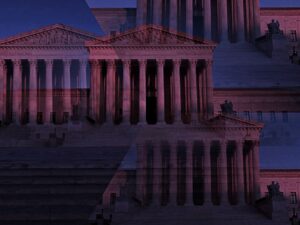

Two Very Important Supreme Court Decisions
When does the government cross the line from using its highly visible bully pulpit to advocate for policies and principles it has every right to promote into the prohibited zone of threatening to use its awesome powers to punish viewpoints it opposes by coercing others to refrain from doing business with the speaker.
In two very important recent decisions, the U.S. Supreme Court was asked to decide whether it is still the law of the land that a government entity’s “threat of invoking legal sanctions and other means of coercion” against a third party “to achieve the suppression” of disfavored speech violates the First Amendment.
In National Rifle Association v. Vullo, in a rare unanimous opinion written by Justice Sonia Sotomayor, the Court held that “Government officials cannot attempt to coerce private parties in order to punish or suppress views that the government disfavors.”
But the decision in the related case of Murthy v. Missouri, was not unanimous. In that case a federal district judge had ruled that the U.S. Surgeon General (Vivek Murthy) and other government officials violated the First Amendment by seeking to convince social media platforms to remove content the government deemed disinformation about COVID, the 2020 election and other subjects.
But on June 26, the Court punted. A 6 member majority – made up of both conservatives and liberals – held that the plaintiffs did not have standing. In dissent, three conservative justices said they would have found standing and on the merits they would have found a First Amendment violation.
Guest – Attorney David Cole argued the NRA case in the Supreme Court. He’s been the National Legal Director of the American Civil Liberties Union (ACLU) since 2016. He previously served as a staff attorney for the Center for Constitutional Rights. He has litigated a wide array of major civil liberties controversies and has personally argued 8 cases before the US Supreme Court and served as counsel in more than 30.
—-
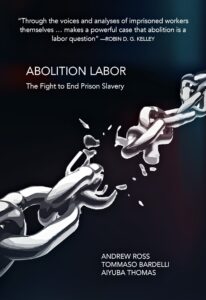

Abolition Labor: The Fight To End Prison Slavery
Operating in the secrecy of the nation’s more than 1,800 prisons, a kind of shadow slave culture is being fostered. Few Americans are aware of the exploitative and pervasive practice of forced prison labor. The 13th amendment to the US Constitution abolished slavery, but it made one exception: prison labor.
Prisoners are forced to work with minimal or non-existent wages, and often with no labor protections. Understanding the scope and implications of forced prison labor is crucial for anyone concerned with social justice and equity. It calls for a re-examination of our treatment of incarcerated persons and for alternatives that promote fairness for everyone, regardless of their legal status. By shining a light on this issue, we can advocate for reforms that prioritize rehabilitation over punishment and strive towards a more just and humane criminal justice system. A new book, Abolition Labor: The Fight To End Prison Slavery, provides an eye-opening overview of the extent of this problem.
Guest – Andrew Ross is a renowned social activist, author, and Professor of Social and Cultural Analysis at New York University, where he also directs the Prison Research Lab. Andrew has contributed to prominent publications like The Guardian, The New York Times, and The Nation. He has authored or edited over twenty-five books, with the recent work, Abolition Labor, co-authored with Aiyuba Thomas and Tommaso Bardelli.
Guest – Aiyuba Thomas recently earned his M.A. from NYU’s Gallatin School of Individualized Study and is an affiliate of the NYU Prison Research Lab. He currently serves as project manager for the Movements Against Mass Incarceration’s archival oral history project at Columbia University. There, he documents the experiences and challenges faced by those affected by the criminal justice system. His firsthand perspective and his extensive knowledge on the subject makes him a powerful voice in the conversation of abolishing forced prison labor.
—————————————-
Civil Rights, Gaza, genocide, Human Rights, U.S. Militarism, Violations of U.S. and International Law, War Resister, Whistleblowers
Podcast: Play in new window | Download
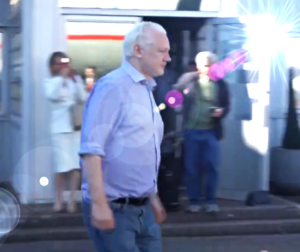

Freedom For Julian Assange!
After serving 1901 days in solitary confinement in a tiny cell in the infamous Belmarsh prison in London, journalist and publisher Julian Assange is free at last.
Julian gained his freedom pursuit to a plea bargain with the government of the United States which had sought to extradite him and try him under the 1917 Espionage Act. He faced a certain conviction in a hostile Virginia court and 175 years in prison on 17 counts of conspiracy to commit espionage for receiving and publishing information damaging to the United States government.
Julian Assange was forced to plead guilty to one count of espionage in return for the time he has served in prison. Prior to that he was confined for seven years in the Ecuadorian Embassy in London, where he had sought and received political asylum.
The alleged crime he was accused of committing was the receipt and publication in 2010 of the so-called Iraq and Afghanistan war logs which document American government guilt in torture and murder including the 11 civilians and two Reuters journalists.
Julian Assange was sentenced to time served by an American federal court judge on an island in the Pacific Ocean 2000 miles from Australia. Julian Assange will now be living as a free man in Australia with his wife and two children.
Until Julian Assange Is Pardoned Press Freedom Remains At Risk – article by co-host attorney Stephen Rohde
Guest – Randy Credico, a steadfast supporter of Julian Assange. Mr. Credico. hosted the program “ Countdown to Freedom” in support of Julian for many years. He had visited him in Belmarsh prison.
—-
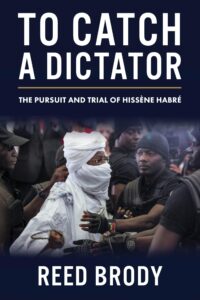

War Crimes, Dictators and the ICC
The International Criminal Court (ICC) along with the International Court of Justice (ICJ) were set up in 1998 in order to help prevent wars and crimes against humanity with the profound understanding that without a system of international law. a future World War III might eliminate humanity.
The United States of America, under Bill Clinton, was one of seven countries that voted against the Rome statute which set up the International Criminal Court. Clinton did eventually sign the statute but George Bush “unsigned“ it and the United States has had a testy relationship with the court. Indeed under Trump, the US imposed sanctions on the court and its prosecutor.
Last month Imran Khan, the chief prosecutor of the International Criminal Court, issued arrest warrants for Israel Prime Minister Benjamin Netanyahu and Yoav Galant, the Israeli Minister of Defense for war crimes and crimes against humanity. The ICC also issued arrest warrants for three top leaders of Hamas.
Guest – Attorney Reed Brody, was a friend, colleague, and mentee of our late cohost Michael Ratner. Reed Brody is the author of the recently published book To Catch a Dictator: The Pursuit and Trial of Hissene Habre. He has worked for many years with Human Rights Watch. Reed Brody has helped pursue the dictators Augusto Pinochet of Chile and Jean-Claude “ Baby Doc” Duvalier of Haiti. He has uncovered atrocities by US backed Contras in Nicaragua, led United Nations missions in El Salvador and the Congo, and exposed Bush administration torture.

—————————————-
Civil Liberties, genocide, Human Rights, Targeting Muslims, U.S. Militarism, Violations of U.S. and International Law, War Resister
Podcast: Play in new window | Download


A Brief History of Kill Lists, From Langley to Lavender
Two artificial intelligence systems are being used by Israel and the United States to compile kill lists of Palestinians in Gaza. They are called Lavender and Where’s Daddy. This has led to the indiscriminate slaughter of whole families and has killed mostly women and children. The CIA and the US military have always tried to use the latest data processing technology to identify and kill their enemies. The history of American government assassinations goes back to collaborating with ex-Nazi intelligent officers after World War II.
Guest – Medea Benjamin, is co-founder of the international antiwar organization CODEPINK. She is the author of several books, including, with Nicholas J.S. Davies, War in Ukraine: Making Sense of a Senseless Conflict. She has been an advocate for social justice for more than 40 years. Described as “one of America’s most committed — and most effective — fighters for human rights” by New York Newsday, and “one of the high profile leaders of the peace movement” by the Los Angeles Times, she was one of 1,000 exemplary women from 140 countries nominated to receive the Nobel Peace Prize on behalf of the millions of women who do the essential work of peace worldwide.
—-
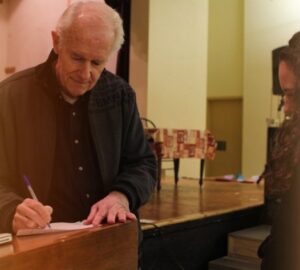

A Trend In Abolishing Capital Punishment
A growing number of states have abolished capital punishment in recent years. However, the death penalty remains on the books in 27 states, although the number of executions in American is at an all-time low. It is well documented that the death penalty is riddled with fatal flaws. Literally, the flaws are denying defendants a fair trial and are killing innocent people. An average of 4 wrongly convicted death-row prisoners have been exonerated each year since 1973.
According to recent research, jurors are three times more likely to recommend a death sentence for a black defendant than for a white defendant in a similar case. The death penalty does not serve as a deterrent. A study by the Death Penalty Information Center found that the South has consistently had by far the highest murder rate, yet the South accounts for more than 80% of all executions. The Northeast, which has fewer than 0.5% of all executions, has consistently had the lowest murder rate.
Guest – Mike Farrell is the President of Death Penalty Focus, an organization on whose Board I’ve served for many years. Known to millions as “B.J. Hunnicutt” on television’s historic show “M*A*S*H,” he is also a writer, director and producer. A human rights activist for over 35 years, Mike has taken part in scores of aid missions and human rights delegations to countries all over the world. Mike has visited prisons and been personally involved in numerous death penalty cases across the U.S. for over three decades.

—————————-
























